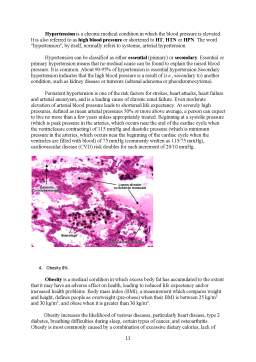Extras din proiect
Heart failure (HF) is a condition in which a problem with the structure or function of the heart impairs its ability to supply sufficient blood flow to meet the body's needs. The phrase is often wrongly used to describe other cardiac-related illnesses, such as myocardial infarction (heart attack) or cardiac arrest.
Common causes of heart failure include myocardial infarction and other forms of ischemic heart disease, hypertension, valvular heart disease and cardiomyopathy. Heart failure can cause a large variety of symptoms such as shortness of breath (typically worse when lying flat, which is called orthopnea), coughing, ankle swelling and reduced exercise capacity. Heart failure is often undiagnosed due to a lack of a universally agreed definition and challenges in definitive diagnosis. Treatment commonly consists of lifestyle measures (such as decreased salt intake) and medications, and sometimes devices or even surgery.
Heart failure is a common, costly, disabling and deadly condition. In developing countries, around 2% of adults suffer from heart failure, but in those over the age of 65, this increases to 6–10%. Mostly due to costs of hospitalization, it is associated with a high health expenditure; costs have been estimated to amount to 2% of the total budget of the National Health Service in the United Kingdom, and more than $35 billion in the United States.Heart failure is associated with significantly reduced physical and mental health, resulting in a markedly decreased quality of life. With the exception of heart failure caused by reversible conditions, the condition usually worsens with time. Although some patients survive many years, progressive disease is associated with an overall annual mortality rate of 10%.
Terminology
Heart failure is a global term for the physiological state in which cardiac output is insufficient for the body's needs.This occurs most commonly when the cardiac output is low (often termed "congestive heart failure").
In contrast, it may also occur when the body's requirements for oxygen and nutrients are increased, and demand outstrips what the heart can provide, (termed "high output cardiac failure"). This can occur in the context of severe anemia, Gram negative septicaemia, beriberi (vitamin B1/thiamine deficiency), thyrotoxicosis, Paget's disease, arteriovenous fistulae or arteriovenous malformation.
Fluid overload is a common problem for people with heart failure, but is not synonymous with it. Patients with treated heart failure will often be euvolaemic (a term for normal fluid status), or more rarely, dehydrated.
Doctors use the words "acute" to mean of rapid onset, and "chronic" of long duration. Chronic heart failure is therefore a long term situation, usually with stable treated symptomatology.
Acute decompensated heart failure, which should just describe sudden onset HF, is also used to describe exacerbated or decompensated heart failure, referring to episodes in which a patient with known chronic heart failure abruptly develops symptoms.
There are several terms which are closely related to heart failure, and may be the cause of heart failure, but should not be confused with it:
Cardiac arrest, and asystole both refer to situations in which there is no cardiac output at all. Without urgent treatment, these result in sudden death.
Cardiac arrest, (also known as cardiopulmonary arrest or circulatory arrest) is the cessation of normal circulation of the blood due to failure of the heart to contract effectively., and if this is unexpected can be termed a sudden cardiac arrest or SCA.A cardiac arrest is different from (but may be caused by) a heart attack, where blood flow to the heart is interrupted.
Arrested blood circulation prevents delivery of oxygen to the body. Lack of oxygen to the brain causes loss of consciousness, which then results in abnormal or absent breathing. Brain injury is likely if cardiac arrest goes untreated for more than five minutes. To improve survival and neurological recovery immediate treatment is important.]
Cardiac arrest is a medical emergency that, in certain situations is potentially reversible if treated early. When unexpected cardiac arrest leads to death this is called sudden cardiac death (SCD). The treatment for cardiac arrest is cardiopulmonary resuscitation (CPR) to provide circulatory support, followed by defibrillation if a shockable rhythm is present. If a shockable rhythm is not present after CPR and other interventions, clinical death is inevitable.
Cardiac arrest is classified into shockable versus non–shockable, based upon the ECG rhythm. The two shockable rhythms are ventricular fibrillation and pulseless ventricular tachycardia while the two non–shockable rhythms are asystole and pulseless electrical activity.
Signs and symptoms
Cardiac arrest is an abrupt cessation of pump function in the heart (as evidenced by the absence of a palpable pulse). Cardiac arrest can usually be reversed with prompt intervention, but without such intervention, it will almost always lead to death. In certain cases, it is an expected outcome to a serious illness
However, due to inadequate cerebral perfusion, the patient will be unconscious and will have stopped breathing. The main diagnostic criterion to diagnose a cardiac arrest, (as opposed to respiratory arrest which shares many of the same features), is lack of circulation, however there are a number of ways of determining this.
Preview document
Conținut arhivă zip
- Heart Failure.docx








































